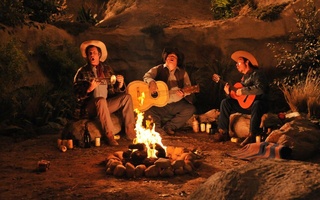Violent drug cartels along the United States-Mexico border might provoke images of armed, ski-masked gangsters. In “Casa de mi Padre,” the exposition of these forces come into contact with an unlikely figure: a simpleminded ranchero named Armando Alvarez (Will Ferrell). While the film could have easily been nothing more than another goofy Will Ferrell movie, it distinguishes itself through its diverse and comically gifted cast and cutting social commentary.
“Casa de mi Padre,” a comedy entirely in Spanish, is set on the Alvarez family ranch in Mexico. Armando’s newly affluent brother Raul (Diego Luna) returns from the city to aid their father, who is struggling to maintain the ranch’s finances. Following Raul’s return, however, several violent incidents—perpetrated by the drug lord Onza (Gael García Bernal)—begin to suggest that his earnings might be ill-gotten.
Though a comedy about such a grave issue can often turn insensitive and crude, “Casa de mi Padre” maintains a light, playful sense of humor that bypasses these potential pitfalls—in an exemplary scene a character is shot yet attempts to take swig after swig from his glass of scotch while falling to the ground in slow motion. The tone of the film mimics the laughable melodrama of a telenovela, with forbidden love affairs and dramatically lit close-ups of characters’ faces, but avoids any uncomfortable level of cultural parody. Added to the melodrama is the quality of the exorbitantly extravagant scenic shots, which are fresh and occasionally lovely. The sumptuous soundtrack also reinforces the overblown tone.
Much of the humor comes from this endearingly exaggerated tone, typically embodied by Ferrell’s trademark faux gravitas. Armando, a man-child whose stupidity embarrasses his family, is not a novel character for Ferrell. In fact, the character is so similar to Ferrell’s roles in movies such as “Anchorman” and “Step Brothers” that the film comes dangerously close to being merely a recreation of these characters in Spanish.
The film comes nearest to repetition of these films in scenes where Armando jokes with his equally dim-witted friends, Esteban (Efren Ramirez) and Manuel (Adrian Martinez). Ramirez and Martinez lack the honed comic timing that helps Ferrell pull off some of the less inspired jokes. Dialogues between Armando and his lover Esmeralda (Mariann Gavelo) also feel a bit tired, largely because Gavelo’s performance is not as charmingly foolish.
Ultimately, however, “Casa de mi Padre” avoids merely echoing Ferrell’s similar films because he is pushed out of English and away from perennial co-stars such as Steve Carrell and John C. Reilley. Instead, the co-stars of “Casa”—Luna and Bernal—perform with fresh comedic styles. Luna wonderfully mocks a “cool,” Antonio-Banderas-style Mexican gunslinger. Bernal’s darker and subtler performance pokes fun at a slick villain one might see in “Desperado” or “Once Upon a Time in Mexico,” at one point ridiculously holding two lit cigarettes in his mouth at once.
Some of the flatter jokes are those that seem to be funny only by extension and repetition, such as Armando cracking a bad joke and laughing idiotically for an uncomfortably long time with Esteban and Manuel. Some gags rely on purposeful failures in the set and other low-budget gimmicks that are more successful at their subtlest—using the same footage of passing a truck each time Armando and his buddies drive—and less so at their most obvious, such as a tediously long scroll of text explaining that footage of an “awesome” fight scene was lost during production.
Despite these cheap thrills, the message of “Casa” is cogent, exemplified by a fantastic dialogue that takes place between Armando and Raul wherein they discuss how Americans fear Mexican drug violence yet refuse to forgo the drugs that cause it. Armando mocks the politicians who condemn drug cartels while ignoring their heroin-addicted housewives. The root of the conflict rests with Americans. Perhaps the most poignant moment is when, in the middle of a bloody gunfight, a DEA Agent (Nick Offerman) exclaims, in English, “All this so daddy’s little girl can score a dime bag.” Despite the occasionally drawn-out or repetitive gags, “Casa de mi Padre” has some powerful moments, mostly when it ventures into such social commentary.
Read more in Arts
POPSCREEN: Call Me Maybe













